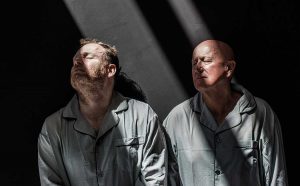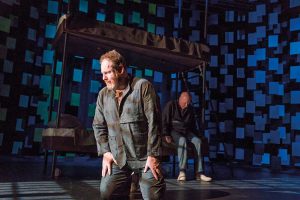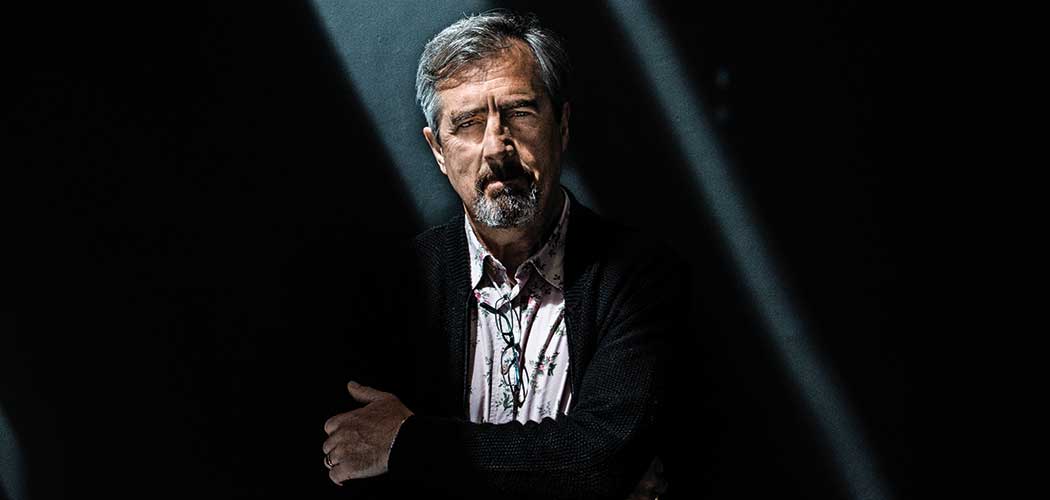Sebastian Barry is one of Ireland’s greatest living writers and is the current Laureate for Irish Fiction. On Blueberry Hill is Barry’s first new play for 10 years and the internationally acclaimed Irish theatre company Fishamble is transferring its production to the Trafalgar Studios this month. The play is about PJ, a gay Catholic priest, and his friendship of 20 years with construction worker Christy, as they share a lifetime behind bars. Sebastian Barry’s own gay son played a role in the gestation of On Blueberry Hill as the writer explained to us in this exclusive interview.
On Blueberry Hill sounds like a light, even joyful play but it’s based in Mountjoy Prison in Dublin where your two characters have spent 20 years together serving life sentences for their separate very serious crimes, why did you choose the play’s title?
Fats Domino was the favourite singer of a particular heroic person on whom the character of Christy is partly based. The real person of course committed no crimes. In Ireland we are slightly obsessed with a thing called Irish freedom. Freedom is a very ambiguous concept for the two men in the cell, as it happens. When Fats Domino sings the song, it seems to begin ‘I found my freedom, on Blueberry Hill…’ but that’s not what the official lyrics give. I liked that a lot.
Can you tell us more about the priest PJ, who is gay, and suffers one of those lapses which completely destroys his life?
If the two lovers in my novel Days Without End, in 1860s America, don’t face much prejudice (they face a lot of other sorts of danger), PJ has had the misfortune to be born into the 1950s and 60s in Ireland. He’s also a Catholic, and one of our pastimes sadly is entirely unnecessary guilt. My friend Colm Tóibín made a wonderful statement recently, he said the trouble with growing up gay in Ireland in the Sixties wasn’t that there was no such thing as homosexuality, but that there was no such thing as heterosexuality either. PJ’s love for his fellow seminarian Peadar is strong and clear, but he wavers in it, with tragic consequences. It’s partly what the play is about, PJ himself trying to work out what exactly he did, and why. In essence I would say he is a good man.
Was he based on anyone you knew?
Well, most of PJ’s memories in the play are versions of my own memories of my mother, and other family members, like my mighty great aunt Annie. There is an element of self portrait in PJ. I was never a seminarian, not much of a Catholic, and I haven’t been accused of murder, but still – I feel close to him, and his friendship with Christy, for which he is extremely thankful, as it were, is a version of how close I felt to the original of Christy.

You have described you were first commissioned to write On Blueberry Hill in 2009, but it was your son Toby’s coming out as gay which then removed the writer’s block you were suffering from, can you tell us more about what happened with Toby and why it had such a positive effect?
When Toby was born, I wrote some poems about him in a little collection called The Pinkening Boy. I said in one of the poems that he was ‘my reward for being alive.’ All through childhood he was a source of joy. When he was about fourteen he seemed to become depressed, an illness I suffer from myself sometimes, and we were very alarmed for him, because we couldn’t find out what was causing it. Eventually his older sister told him to just tell us, his mother and myself that is – the simple fact that he was gay. It was an extremely liberating, happy morning. Talk about Irish freedom. ‘The thing is, Dad, I’m gay.’ Six hard words so difficult to say, it seems, even when your parents are more than ready to hear. The play was on my desk for a few years already by then, it’s not that it was blocked as such, but it was definitely waiting for Toby’s display of infinite courage and grace. I thought, if Peadar was a person as radiant as that, then anyone could understand PJ’s utter sense of loss, not to mention Christy’s implacable anger. It was a joy to write the parts where Christy talks about his son.
You also got involved in the fight for equal marriage in Ireland, was that an important battle for you?
Yes, of course. Well, I was sitting exactly where I am now, writing this, and Toby was in the other room, and he told me he couldn’t vote yet, because he was just shy of eighteen, and I thought, I’ll have to do some damn thing, no matter how small, so I wrote a short letter to the Irish Times. Before I sent it, I gave it to him to read, and he wept. Now, he never weeps. I thought it might be OK, so to send it. Eventually, like many other things at the time, it went viral, and was even read out in the Australian parliament in an effort to help get things going there. Talk about pride! Subsequently, Toby said to me one day, ‘Well, Dad, you’re not gay – but you’re an ally.’ Great pride again. He gave me a badge with Ally on it to wear at events, but my wife’s name is Ally, so people were asking me why I wore a badge with her name on it. Still.

Your other very different character is Christy, a construction worker, and the play perhaps shows that we are all much more interconnected than we realise? Can you tell us about him?
Ah, Christy. When I was trying to rebuild this house, twenty years ago, this gruff, funny, old-fashioned, whisky-drinking, chain-smoking wonder-person seemed to come along to dig me out of the enormous hole I was in. The house was a wreck, I had very little money, and though he had no reason to do it, he decided to give all his strength and expertise to the enterprise. An angel of some sort. He was full of stories, some of them now in the play. I was very proud to know him. Writers can work alone a lot of the time, it was wonderful to be side by side with another person for a change. Digging ditches, dirty old work. He of course never committed any crimes as I say, and he didn’t have the central experiences of the play in his own life, but… He was the ambassador of a sort of important human quality that is rare.
Is On Blueberry Hill fundamentally about forgiveness?
Trying to get clarity first, really look back into the past and see it clearly, and to be able to fess up, and get the bullshit out of the way with a big bullshit shovel, to see your fellow man with that new clarity, and acknowledge the grace, the elusive grace of kinship, friendship, love – and then yes, forgiveness, when you know exactly what the stakes are.
It also feels like grief plays a big part in the play, do you think as a society that we need to talk more about grief and reflect it more realistically in our books, plays, TV etc?
As the laureate for Irish fiction these last two years, I’ve tried to bring a sort of crazy bookclub into hard-to-reach places, like hospitals, prisons, direct provision centres, mental hospitals, all place where grief is in residence. But what I’ve found is that the next thing after grief — after great grief that assails and alters the person — seems to be grace. So if we can itemize and describe grief, we may do so because we are on the road to other states that come after. So we must try to be clear about grief, even when it is caused by atrocious acts, by trauma. As Seneca said, ‘sometimes even to live is an act of courage.’
Your son Toby has also influenced your novel Days Without End, I understand he discussed drag with you and how gay men from tough backgrounds sometimes used it as a form of empowerment. And that comes into the book? Can you tell us more about the book’s story.
The novel is told by Thomas McNulty, a survivor of the Irish famine as a boy. He reaches America, and one day under a bush in Missouri, sheltering from the rain, he meets another boy, John Cole. They spend the rest of their lives together, and that’s what the book is about. I tried to read as much history as I could find, but gay history is often hard to find, so you have to imagine as much as you can also. But part of Toby’s instruction of his stupid father was to watch our twenty episodes of RuPaul’s Drag Race, and I became fascinated by the stories of some of the young drag artists, who oftentimes had such tough experiences growing up. So that eventually I could understand their performance as a sort of radiant victory – a transformative act of pure magic. That’s in the novel in that Thomas and John do a theatre act that I tried to imagine as a very early version of drag, which as a theatre person I found very interesting to try and do.
Toby has also suffered homophobic abuse in Ireland which you’ve talked about? How is Toby now?
Toby has finished college, his band is called Babylamb and they have just released their first single, Bodyright, online, and have started to gig around Dublin. He continues to be that amazing person.
What would you hope Boyz readers would take from seeing On Blueberry Hill?
That human love is a radiance independent of our human confusion and chaos, and indeed the cure for it. That being gay is probably, all things considered, the more radiant state of being. Which is why there was probably a tone of affectionate pity in Toby saying, ‘Well, Dad, you’re not gay…’
Photograph of Sebastian Barry by Mattieu Chardon, Publicis Dublin.
On Blueberry Hill is at Trafalgar Studios from 5 March to 1 May. To book tickets visit onblueberryhill.co.uk.














